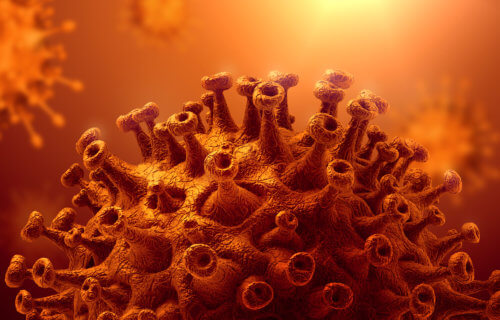ZURICH, Switzerland — The word “coronavirus” is now synonymous with the COVID-19 pandemic, but largely harmless coronaviruses capable of infecting humans have been around for decades. Now, researchers from the University of Zurich report prior exposure to mild coronaviruses actually provides a certain degree of immunity against SARS-CoV-2, the virus causing COVID-19.
“People who have had strong immune responses to other human coronaviruses also have some protection against SARS-CoV-2 infection,” explains Alexandra Trkola, head of the Institute of Medical Virology at UZH, in a university release.
To research this topic the team at UZH put together a specially designed test capable of analyzing antibody levels against four other human coronaviruses among 825 serum samples, all collected before SARS-CoV-2 emerged. The team also analyzed another 389 samples coming from donors with COVID-19. Those analyses, in combination with a series of computer-based models, allowed the research team to accurately estimate how efficiently the antibodies would bind to and neutralize invading coronaviruses.
That process led to the revelation that people with lots of antibodies for harmless coronaviruses are much less likely to develop serious COVID-19 symptoms requiring hospitalization upon infection. Scientists refer to this phenomenon as cross-reactivity. It also occurs within T cell responses, which are an additional line of immune defense against infections.
“Our study shows that a strong antibody response to human coronaviruses increases the level of antibodies against SARS-CoV-2. So someone who has gained immunity to harmless coronaviruses is therefore also better protected against severe SARS-CoV-2 infections,” Trkola adds.
Does getting COVID keep other coronaviruses away?
While the level of protection provided by such exposure pales in comparison to vaccination or recovery from COVID-19 infection, these findings are still quite valuable as the international medical community continues to work tirelessly toward better understanding SARS-CoV-2 and how to end the pandemic once and for all.
“Of course, immune responses targeting SARS-CoV-2 that are mounted by the memory cells are far more effective than cross-reactive responses. But even though the protection isn’t absolute, cross-reactive immune responses shorten the infection and reduce its severity. And this is exactly what is also achieved through vaccination, just much, much more efficiently,” Trkola comments.
Does prior COVID-19 infection also offer some immunity against various other coronaviruses? As of now, researchers are unsure if this relationship works both ways. It may seem like a trivial question at first, but if cross-reactivity does work in the opposite direction, it could be a major advantage against future emerging variants.
“If SARS-CoV-2 immunity also offers some degree of protection from infection with other coronaviruses, we would be a significant step closer to achieving comprehensive protection against other coronaviruses, including any new variants,” Trkola concludes.
The study appears in the journal Nature Communications.
